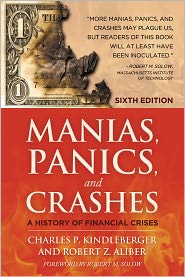I have just started reading Manias, Panics and Crashes: A History of Financial Crises by Charles P. Kindleberger and Robert Z. Aliber. One of the topics they address is why investors -- who are often presumed by economists to make rational decisions -- invest manically at times driving prices to much more than the things they are buying are worth.
First, I have always thought that economic models assuming rationality were useful in improving understanding, but not necessarily accurate models of real behavior.
Several things occur to me:
- People don't make rational economic decisions. Even large scale investors often fail to do calculations of how much the things that they are planning to buy are actually worth.
- Anyone who has ever bet on a sports event knows that people differ in the probabilities that they assign to the different outcomes, even if they have similar information. Unless people differed on the probability that they assigned to different outcomes, they (normally) would not bet against each other. It is difficult to predict outcomes ("especially about the future" as some savant is said to have said).
- There is a considerable difference in the amount and quality of information that different investors have about the things that are bought and sold in the market, and even greater differences in the amount of information that they actually use. So too, there are different capabilities in the ability to utilize the information that they do have.
- Different participants in a market have different abilities to participate in market transactions. Some people follow the market closely and can quickly buy and quickly sell. Someone who can quickly identify the end of a mania and the start of a crash, and can quickly sell off his investments is in a much better place to make money during a bubble than most of us who are less agile. After all, all you have to do to make money during a bubble is to buy early enough to get a low price and sell early enough to get a high price.
- Not everyone is facing the same incentives. The fund manager that can show big paper profits for a couple of years in the manic phase of a bubble will get huge pay incentives. He will not have to give them back when his investors lose money in the following panic and crash. Unfortunately, many investors are at the mercy of their investment agents who have these differing incentives.

2 comments:
Keynes wrote about "Animal Spirits". Daniel Kahneman won the Nobel Prize for Economics for showing that there are consistent biases in human economic decision making.
And Greenspan coined the term "irrational exuberance".
Post a Comment